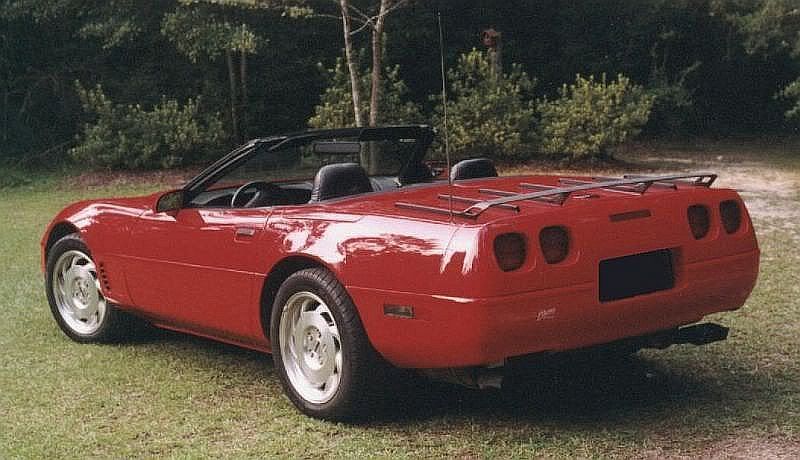...The problem I believe was the cars built from 1967 to 1997 were spotty on quality and maintenance...But the 1996 was a great car...
So, which is it? Was the '96 "spotty on quality and maintenance", or was it "a great car"? Perhaps a bit of both.
I'm in the Milwaukee, WI area. In early June of '97, I began my search for a new GS coupe. Yes, it was very late, but I didn't have the money until then and I refused to borrow it. I asked a couple of the local dealers to help me find one, and after beating the bushes for awhile, they finally had to go national. It turned out that there was only
one left, and it was at a dealer in Orlando, FL. I contacted them, and after confirming that the car had
all the options, we made the deal...and my wife and I drove down there over the July 4th weekend to take delivery. We both had to be back to work right after the weekend, so it had to be a strictly down-and-back road trip with no slop in the return schedule. While looking the car over at the dealer before signing the papers, the hood was up...and I noticed that the fat PCV connecting hose on the passenger side of the throttle body was disconnected. That's at least a 1/2"dia. vacuum leak! I didn't even say anything, I just connected it. The rest of the car seemed perfect, so I signed the papers...and off we went toward home, her leading the way and me following in the GS. After about two hours, I decided to engage the cruise control and...it didn't work! We didn't have time to turn around, so we just kept going. Later on, I had to blow the horn at someone, and it didn't sound right. The rest of the trip went OK. When we got home, I checked the horn and only one was working. The passenger side horn was completely dead. The cruise control switch on the clutch pedal proved to be miss-adjusted, which prevented the cruise from engaging. I replaced the horn and readjusted the cruise switch. While poking around under the hood, I noticed that the bolt that holds the positive battery cable to the battery looked kind of crooked, so I grabbed a hold of the cable...and it was quite loose. It turned out that the bolt was tight, it was just cross-threaded! When I removed it, I could see that the threads on that special, captured cable bolt were ruined. The whole positive cable would have to be replaced if the car was going to remain "correct". Unfortunately, it was July of '97 and GM had already changed the spec and part number on that cable...and I had a
hell of a time finding the correct NOS cable since, amazingly, most of the dealers didn't seem to have the original type in stock anymore. There was various other minor stuff as well (extra screws/hardware laying around in the car, stripes less than perfect, etc.), but I sorted all of it out in short order...and the car has been "a great car" ever since.
This was my first new corvette since my '78 L82 (which came with a spotty paint job) so I can't speak to the quality of those intervening years, but judging by my GS, at the end of the '96 model run the integrity of the production process at Bowling Green was definitely nowhere near where it needed to be. I think it was a testament to the quality of the over-all design that my car managed to survive that crappy assembly process, very nearly intact. Having worked on an automotive assembly line, I knew better than to blame the assemblers for the sloppy details on my car. See below...
The cars got worse unit 1989 & 1990 when GM showed the unions and engineers that it was time to shape up or get out. I'm no way an expert, ( we have quite a few of them here who'll be glad to dismiss my opinion)...
OK, this statement could only have been made by someone who has never worked (or even been) in a U.S. auto plant. I spent years on an assembly line and, later, in plant and quality engineering. I also met, literally, thousands of like individuals...and I can tell you honestly that almost universally, we always did the very best job that company management would
allow us to do. It was fairly rare that we would have enough time, or the correct tools, or quality parts/materials, to do our jobs properly...and we were always left to agonize over the results, which were, nevertheless, beyond our control. Then we got to go home from work, turn on the evening news, and hear how the dire condition of the American auto industry was entirely the fault of the U.A.W. Most folks formed their opinions of the American auto worker based solely on what company managers would tell the media when they were asked why the Japanese built better cars than we did. If you were a company manager, and someone from the media shoved a microphone in your face and asked what the problem was, would you be more inclined to blame underlings who couldn't defend themselves, or would you point your finger at yourself? Nobody from the media ever asked anyone from the U.A.W. what the problem was because 1) hey, they're just ignorant, lazy, dishonest line workers, and 2) the companies all had easily reached, friendly, well-dressed P.R. flacks whose job it was to "answer" questions and hand out free Tigers/Pistons/Lions tickets. And all this occurred back when the news was actually still loosely connected with reality.











